The Mediterranean region has long been a cradle of rich cultural traditions and practices, among which traditional healing and natural remedies hold a significant place. Spanning across centuries, the old-world wisdom of the Mediterranean has given rise to a plethora of herbal remedies and natural healing methods that merge seamlessly with the regions’ varied cultures and histories. Herbal medicine here is not just about the physical alleviation of symptoms; it also incorporates psychological and spiritual dimensions, reflecting a holistic approach to wellness that respects the balance between body and mind.

The abundance of potent medicinal plants in the Mediterranean basin, combined with the inherited knowledge of their uses, forms the backbone of these traditional healing practices. Preparation and application of these herbal remedies are guided by timeless principles that consider the unique properties of each plant, as well as the specific needs and conditions of the individual seeking relief. In the modern era, while conventional medicine has made significant advances, there is a growing recognition of the value of integrating such age-old, natural healing practices within a contemporary framework, especially in relation to dietary patterns like the gluten-free Mediterranean diet.
Key Takeaways
- Traditional healing and herbal medicine are integral to Mediterranean cultural heritage.
- The holistic approach of Mediterranean remedies addresses both physical and mental well-being.
- There is a growing appreciation for incorporating traditional healing into modern health practices.
Table of Contents
Historical Context of Traditional Healing

In the tapestry of human history, traditional healing practices have served as the bedrock of healthcare systems. These practices have been particularly prominent in the Mediterranean region, where the natural environment provided a rich pharmacopeia that underpinned local medical customs and influenced far-reaching medical systems.
Herbal Medicine Across Cultures
The use of herbs in the Mediterranean basin can be traced back to ancient civilizations, which documented a variety of plants for their therapeutic properties. Greek scholars, such as Hippocrates and Dioscorides, laid the foundation for herbal medicine, emphasizing the importance of natural elements in treatment. In conjunction with Roman advancements, this knowledge proliferated throughout the Mediterranean. The use of herbs during the Middle Ages continued, with monastic gardens preserving and expanding herbal lore.
Influences of Greek and Roman Practices
Greek methodologies decisively shaped the medicinal landscape, infusing scientific principles into healing arts. Their practices, preserved in texts like the ‘Corpus Hippocraticum’, informed Roman medical practices. It was the Romans who expanded upon Greek foundations, integrating them into a medical system that reached across their empire. Their extensive trade networks and military conquests facilitated a synthesis of regional healing practices.
Contributions from Arab and Egyptian Traditions
Arab and Egyptian civilizations made profound contributions to the medicinal compendium of the Mediterranean. Building upon the ancient wisdom of predecessors, they became esteemed for their advancements in pharmacology and surgical techniques. In Cordoba and other centers of learning, Arab and Egyptian healers translated and augmented Greek and Roman texts, laying groundwork which would endure well into the Renaissance and beyond. These contributions were strikingly evident in the way herbs were utilized both for nutrition in the diet and for their medicinal properties.
Fundamentals of Herbal Medicine

In the tapestry of traditional healing practices, the use of medicinal plants and herbs stands as a testament to the enduring wisdom passed down through generations. These natural elements are keystones in the realm of herbal medicine, influenced by cultural knowledge and the expertise of herbalists.
Role of Medicinal Plants and Herbs
Medicinal plants and herbs have been the cornerstone of traditional medicine across various cultures. They serve a vital function in preventive care, treatment of ailments, and promoting overall well-being. For instance, rosemary and sage, prominent in the Mediterranean diet, are not only praised for their aromatic attributes but also for their anti-inflammatory and antioxidant properties. Medicinal herbs like thyme and oregano are seamlessly integrated into the culinary landscape, transforming meals into preventive medicinal applications which align with a gluten-free Mediterranean approach to health.
- Rosemary:
- Antioxidant properties
- Enhances memory and concentration
- Sage:
- Anti-inflammatory
- Supports digestion
Understanding Herbalism and Herbalists
Herbalism is an ancient practice that involves the study and use of medicinal plants to promote health and prevent illness. Herbalists are practitioners with profound knowledge of plant medicines and their application for healing. These individuals often apprentice under seasoned experts to learn the intricacies of herbal preparations and their proper dosages. The practice of herbalism involves selecting the right herbs, such as lavender for its calming effect or chamomile for its soothing properties on the digestive system.
- Herbalists’ Tasks:
- Identifying medicinal herbs
- Preparing and dosing herbal remedies
- Common Herbs in Herbalism:
- Lavender: Reduces anxiety, improves sleep
- Chamomile: Soothes digestion, anti-inflammatory
In these practices, the deep-seated cultural appreciation for healing herbs is evident. Each plant is respected for its individual potential to contribute to health, aligning with the holistic perspective of herbal medicine.
Natural Remedies and Their Usage

In the Mediterranean region, traditional healing practices often revolve around the use of natural herbs and plants. These remedies have stood the test of time, offering solutions for a variety of health concerns, including digestive issues and immune support.
Common Remedies for Digestion and Sleep
Sage and mint are staples in Mediterranean herbal medicine, particularly for digestive health. Sage is renowned for its ability to soothe digestion, while mint provides relief from indigestion and stomach discomfort.
- Chamomile: A gentle and effective herb for promoting relaxation and sleep.
- Ginger: An anti-inflammatory root that can alleviate stomach upsets.
- Valerian: Commonly used to improve the quality of sleep.
Herbs for Immune Support and Healing Power
The Mediterranean basin is known for herbs that bolster the immune system and expedite healing.
- Echinacea: Well-known for its capacity to strengthen the immune system.
- Turmeric: Contains curcumin, a powerful anti-inflammatory and antioxidant.
- Basil: Holds antiviral properties beneficial in fighting colds and sore throats.
Treatment of Common Ailments with Plants
For centuries, natural medicinal plants have played a crucial role in treating day-to-day ailments.
- Aloe Vera: Used in treating burns and wounds due to its soothing properties.
- Ginger: Effective at reducing fever and joint pain due to its anti-inflammatory effects.
- Chamomile: Known for mitigating inflammation and providing relief from the common cold and sore throats.
Preparation and Application of Herbal Remedies
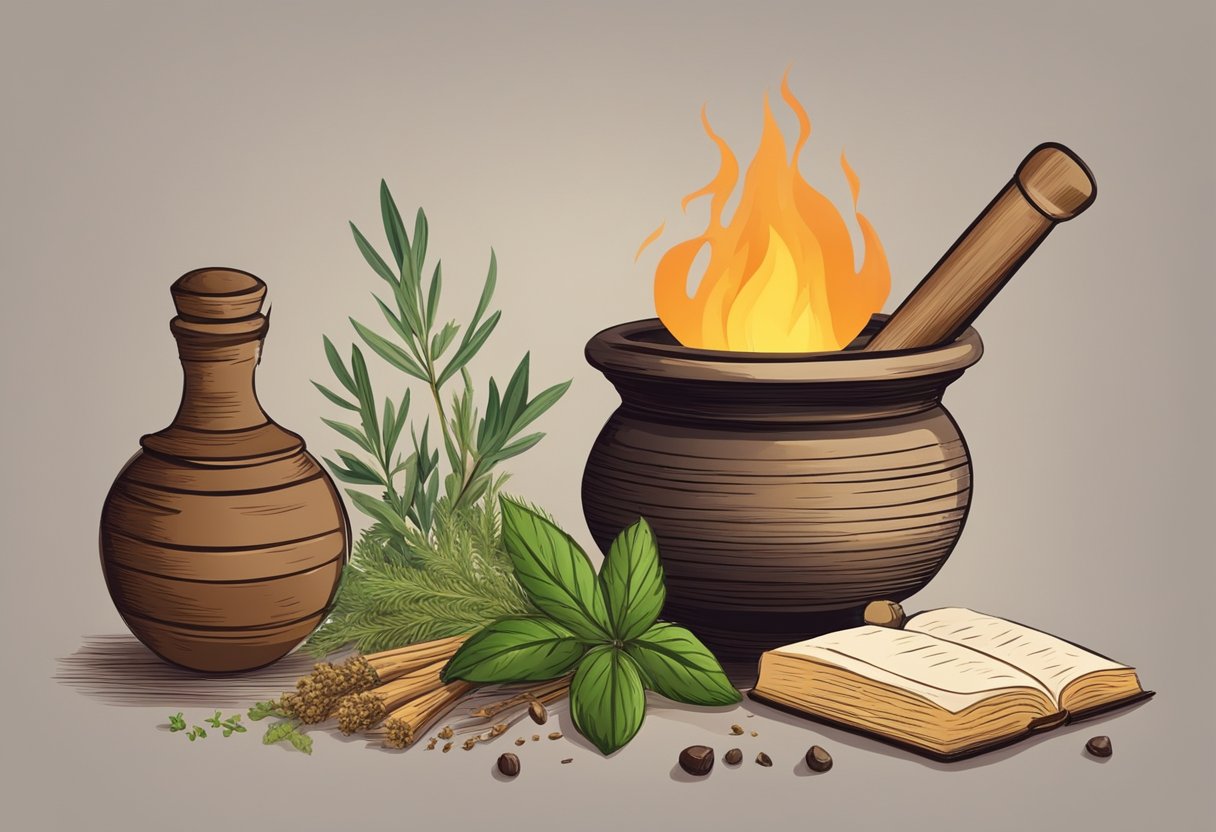
Traditional healing practices in the Mediterranean leverage an assortment of herbal remedies known for their medicinal properties. These remedies are carefully prepared using time-honored recipes and specific methods of extraction.
Recipes and Usage of Herbal Mixtures
In the Mediterranean, herbal mixtures are often tailored to suit individual health needs, with a variety of herbs from the garden blended to enhance their therapeutic benefits. For example, a common mixture might include a base of chamomile and lavender to aid in relaxation. It is crucial to use precise measurements, often down to the gram, to maintain the efficacy of these mixtures.
- Chamomile (2g) – known for its calming effects
- Lavender (1g) – aids in reducing anxiety and improving sleep quality
These herbal remedies are typically steeped in hot water for an infusion or mixed with a carrier oil for topical application.
Tinctures, Infusions, and Other Herbal Formulations
Tinctures are another cornerstone of Mediterranean herbal medicine. They involve soaking herbs in alcohol to extract the active compounds. The process takes several weeks, and the result is a potent liquid that can be taken in small doses.
For infusions, practitioners often use hot water to draw out the medicinal qualities of delicate herbs, such as mint or lemon balm, which are popular for their digestive benefits in a gluten-free diet. The procedure is generally as follows:
- Boil water (100mL)
- Add fresh mint leaves (5g)
- Steep for 5-10 minutes
- Strain and serve
Careful attention is paid to the ratio of herb to solvent, whether it’s water for infusions or alcohol for tinctures, to ensure a consistent and effective remedy.
Psychological and Spiritual Aspects of Healing
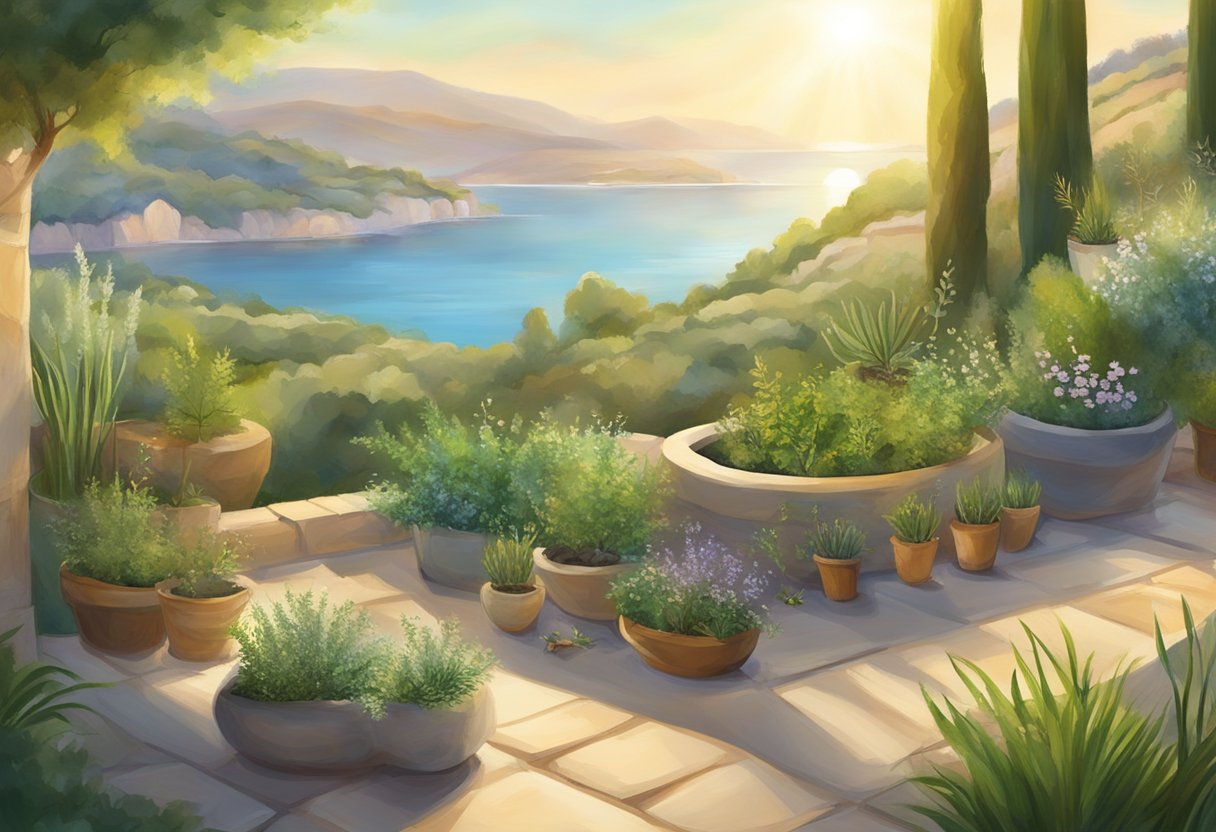
In Mediterranean traditional healing practices, the psychological and spiritual elements form an integral part of addressing mental health challenges, such as depression and anxiety, through a holistic approach that includes the use of natural remedies and rituals.
Impact on Mental Health and Depression
Mental Health servitudes greatly from the composite healing approaches prevalent in Mediterranean cultures. These practices consider the holistic health of an individual, intertwining the physical with the psychological and spiritual. Natural remedies, including those derived from the region’s diverse flora, contribute not only to physical well-being but also to mental balance. For instance, the utilization of lavender or chamomile—staples in the natural Mediterranean pantry—has been traditionally known to alleviate stress and anxiety, promoting a sense of calm.
Mediterranean healing traditions often recognize that a state like depression cannot be secluded from the individual’s overall energy and spirit. Healers might prescribe engaging with nature or employing herbs that are thought to have uplifting properties, often in conjunction with spiritual practices or communal rituals that reinforce social bonds and individual purpose.
Cultural Significance and Sacred Practices
The spiritual dimension of healing is marked by sacred practices that have been passed down through generations. These practices encompass more than mere magic; they are a testament to a deeply rooted belief system that considers the invisible forces of life and their impact on health. Rituals and ceremonies, often involving prayer or meditation, are not uncommon; they serve to engage the person’s mind and soul in a battle against maladies, aiming to restore a harmony that is believed to be disrupted when one is ill.
When one discusses the cultural significance of traditional healing, it is impossible to separate it from the way communities view and interact with the world around them. These practices provide a sense of identity and continuity, which, by itself, can be therapeutically potent, particularly when confronting psychological distress. It is as much about the collective experience as it is about individual well-being, threading the individual’s health into the larger tapestry of community life and ancestral wisdom.
Incorporating Traditional Healing in Modern Times
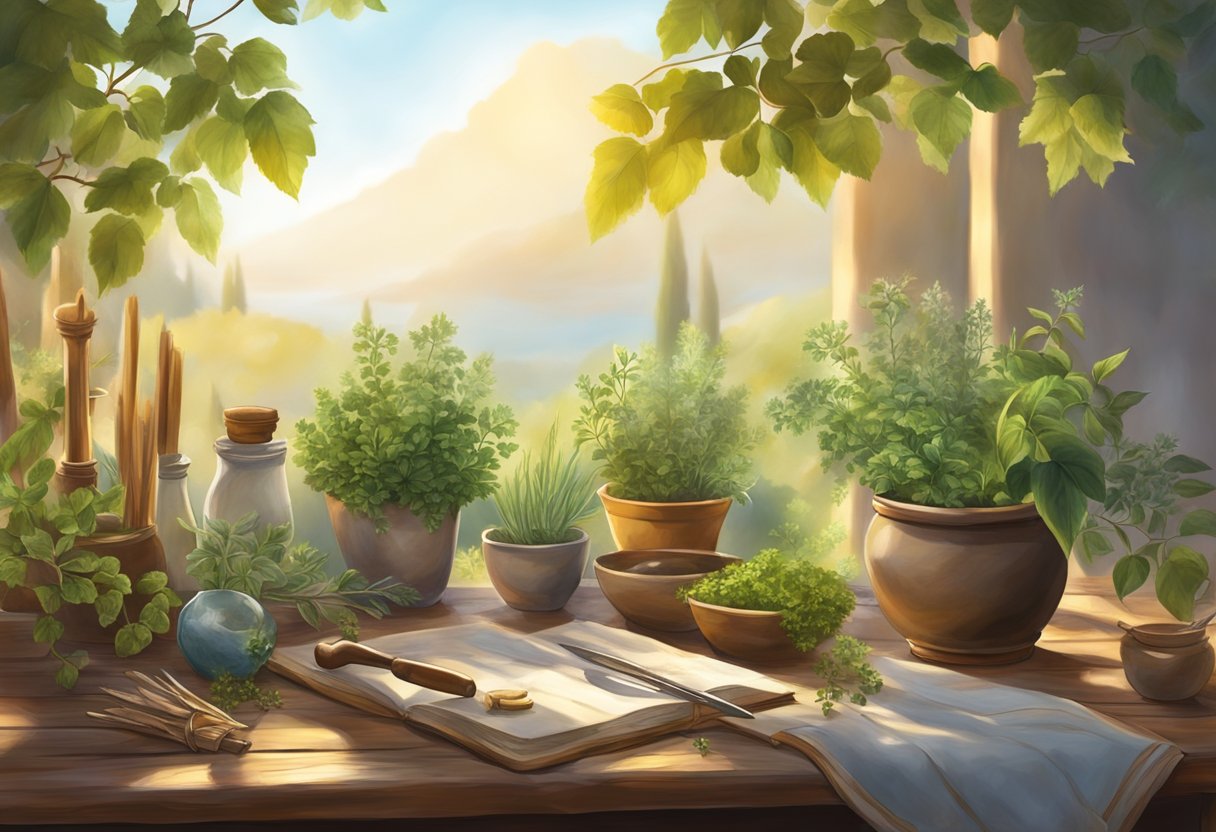
Traditional healing, rooted in centuries of Mediterranean history, merges with modern medicine in an effort to offer holistic health solutions.
The Relationship Between Ancient Practices and Modern Medicine
In the Mediterranean, ancient healing traditions are centered around the use of natural, often plant-based remedies, many of which are still relevant today. This seamless blend of time-honored practices into modern medicine serves not only as an inspiration but also fortifies contemporary healthcare approaches. For instance, ingredients featured in a gluten-free Mediterranean diet, such as olive oil and various herbs, carry both nutritional value and medicinal properties that have been acknowledged by modern science.
These traditional ingredients and methods, once held sacred by ancient civilizations, continue to be examined for their potential benefits and applications in today’s medical field. As humanity advances scientifically, these old-world remedies provide invaluable insights, contributing to a more diverse and comprehensive healthcare system.
Global Challenge and the Role of WHO
The World Health Organization (WHO) plays a pivotal role in addressing the global challenge of integrating traditional healing practices with modern healthcare systems. By fostering a dialogue between different medical traditions and promoting respectful, knowledge-based collaborations, the WHO aims to ensure that these ancient healing practices are not lost to time.
Their commitment to preserving these practices—such as the Mediterranean’s gluten-free remedies for celiac disease—highlights the importance of diversity in medical approaches and respects the cultural significance of these ancient practices. The WHO provides a framework for legitimacy and safety, ensuring that these traditions serve humanity’s health and well-being in the modern era, emphasizing the potential for traditional methods to augment global health strategies.
Integrative Approaches and Diverse Practices
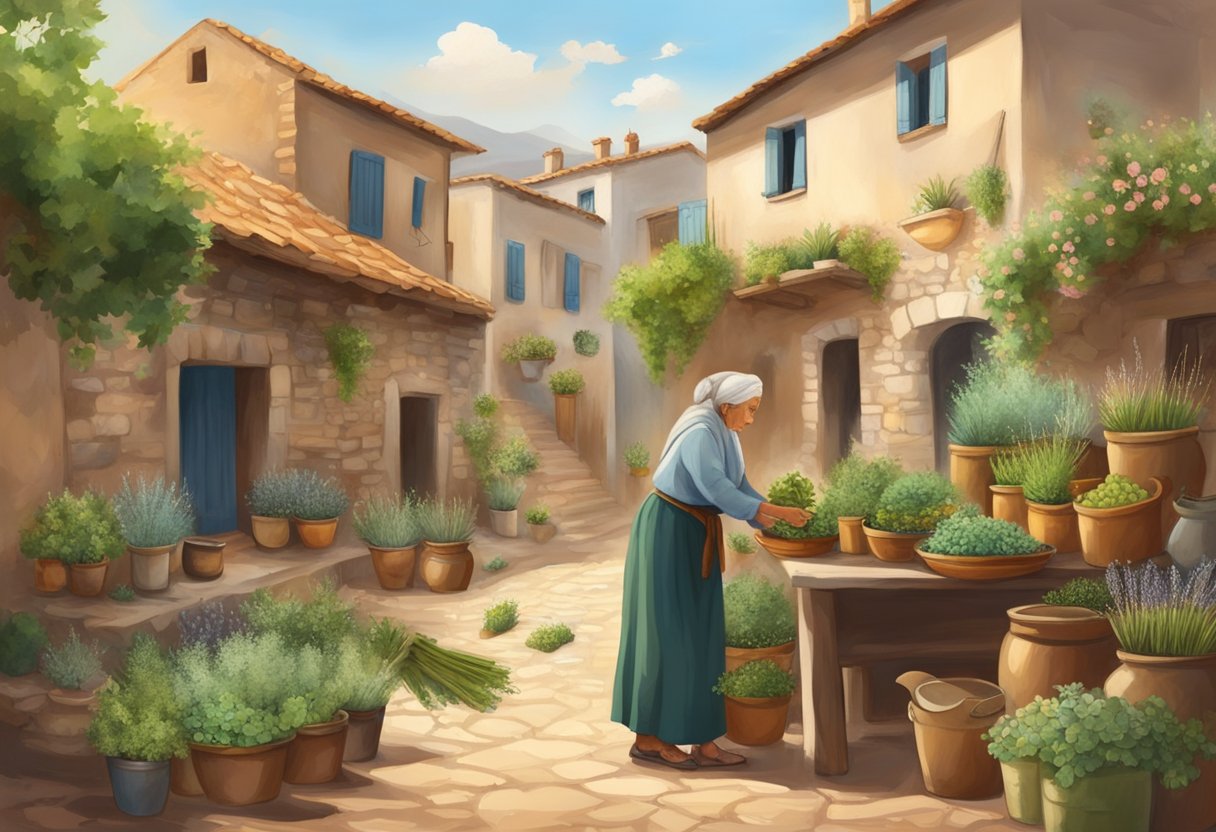
The Mediterranean region has long been a crossroads of culture and healing practices, where ancient wisdom meets modern integrative techniques. Influences from Ayurveda and Traditional Chinese Medicine contribute to the diverse therapeutic landscape, while Unani Medicine provides a connection to Middle Eastern healing wisdom.
Influences of Ayurveda and Traditional Chinese Medicine
Within the tapestry of Mediterranean healing, the principles of Ayurveda from India have been interwoven to promote balance and wellness through diet. Recognizing the importance of diet in managing health, practitioners often incorporate gluten-free options that align with both Ayurvedic teachings and the needs of a Mediterranean lifestyle. Foods like rice and millet serve as staples for those avoiding gluten while embodying the Ayurvedic principle of eating wholesomely.
Traditional Chinese Medicine (TCM), with its rich heritage, also imparts its methodology, particularly through herbal remedies and the philosophy of balancing the body’s energies, or “Qi.” Herbal infusions and dietary recommendations from TCM are adapted to suit the Mediterranean climate and its produce, emphasizing the diversity of available healing options.
Unani Medicine and Middle Eastern Contributions
Unani Medicine, a system with roots in ancient Greece but extensively developed in the Middle East, is another pillar of healing in the Mediterranean realm. It offers a unique perspective on humoral theory, which aligns well with the Mediterranean emphasis on diet and lifestyle for maintaining health. The practice often includes the use of herbs and spices found in the region’s rich culinary palette, with a focus on their medicinal properties.
Middle Eastern contributions enrich the Mediterranean’s natural pharmacopeia, offering a selection of treatments accessible to those with gluten sensitivities. Ingredients such as chickpeas, lentils, and various nuts and seeds make regular appearances in Unani dietary recommendations, blending seamlessly with a gluten-free Mediterranean diet. These are not only nutritious but also provide diverse, gluten-free options that uphold the healing principles of Unani Medicine.
Ethnopharmacology and the Scientific Study of Herbs
Ethnopharmacology bridges traditional herbal wisdom and modern science, focusing on the study of medicinal plants used in various Mediterranean cultures.
Research on Medicinal Plants and Ethnopharmacological Methods
Nature provides a plethora of plants with potential therapeutic effects, and the Mediterranean region is a goldmine for such botanical wealth. Researchers in ethnopharmacology scientifically investigate these plants to validate and document their medicinal properties. They employ various methodologies, such as ethnobotanical surveys and phytochemical analyses, to understand how plants have been used traditionally for health benefits, including those aligning with a gluten-free diet.
For instance, a gluten-free Mediterranean diet might incorporate herbs like rosemary and thyme, which are not only culinary staples but also have been known for their potential anti-inflammatory and antioxidant properties. Ethnopharmacological methods include interviewing local healers, cataloging plants used in traditional remedies, and conducting bioassays to test their efficacy and safety.
Frequently Asked Questions
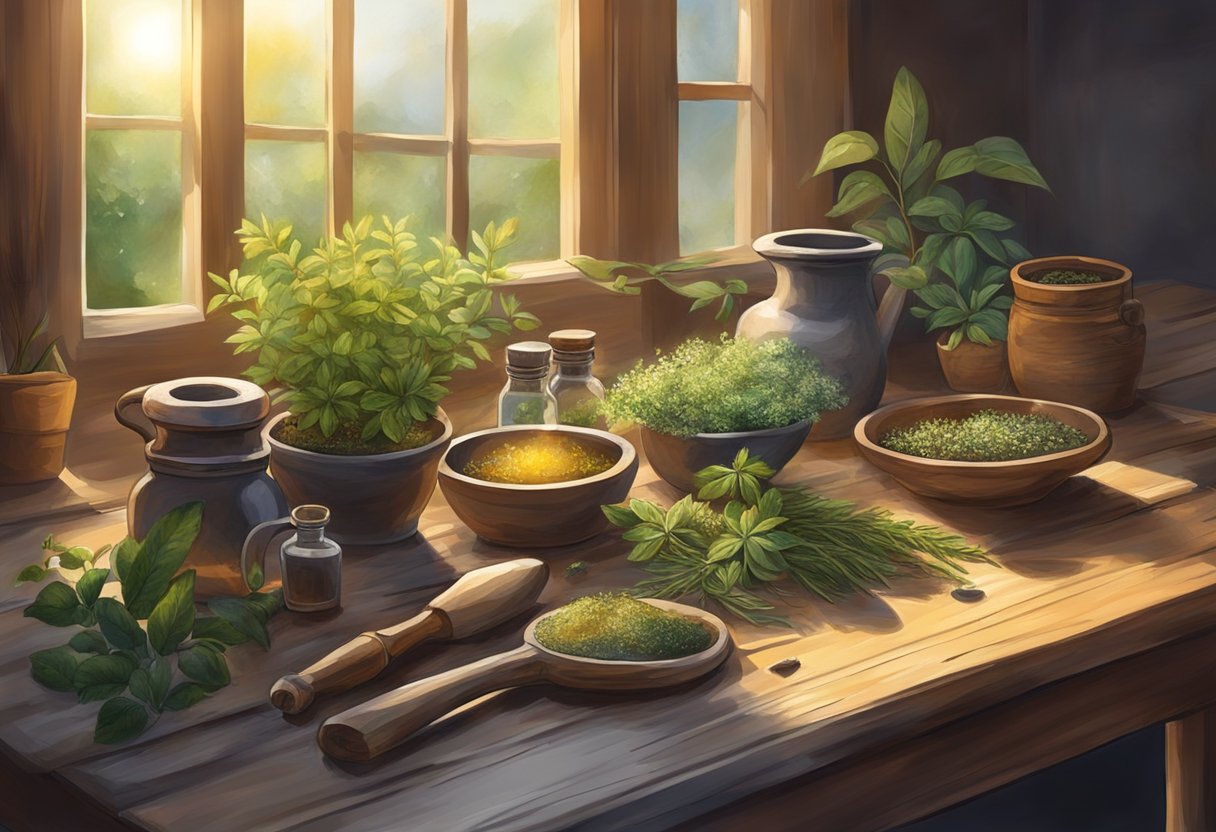
Traditional healing in the Mediterranean region is characterized by a rich legacy of using local herbs and practices that are passed down through generations. These methods offer unique insights and benefits that complement modern healthcare approaches.
What are the key benefits of incorporating traditional healing practices into modern healthcare?
Traditional healing practices can provide holistic treatments that consider the physical, emotional, and spiritual well-being of individuals. These practices often have fewer side effects and can be cost-effective alternatives to contemporary treatments.
How do traditional Mediterranean remedies utilize local herbs for medicinal purposes?
Local herbs, such as lavender, rosemary, and thyme, are staples in traditional Mediterranean remedies. They are used for various medicinal purposes, ranging from soothing digestive issues to providing anti-inflammatory benefits.
In what ways does Arab traditional medicine influence contemporary healing practices?
Arab traditional medicine contributes to contemporary healing practices through its extensive pharmacopeia and surgical techniques. It emphasizes the balance of body elements and promotes healing through dietary adjustments and herbal remedies.
What are the primary roles of traditional medicine within primary healthcare systems?
In primary healthcare systems, traditional medicine serves to enhance patient choice, provide culturally accepted care options, and act as the first line of treatment, particularly in rural and accessible areas.
How do ancient healing methods compare with modern medical techniques?
While modern medical techniques are based on scientific evidence and advanced technology, ancient healing methods rely on natural remedies and centuries-old wisdom that support the body’s healing processes and overall well-being.
Can you list examples of ancient herbs used in Mediterranean traditional healing and their uses?
Yes, for instance, oregano is valued for its antibacterial properties, while sage is recognized for its ability to ease sore throats and coughs, and mint is used for its digestive benefits in the Mediterranean traditional healing.



